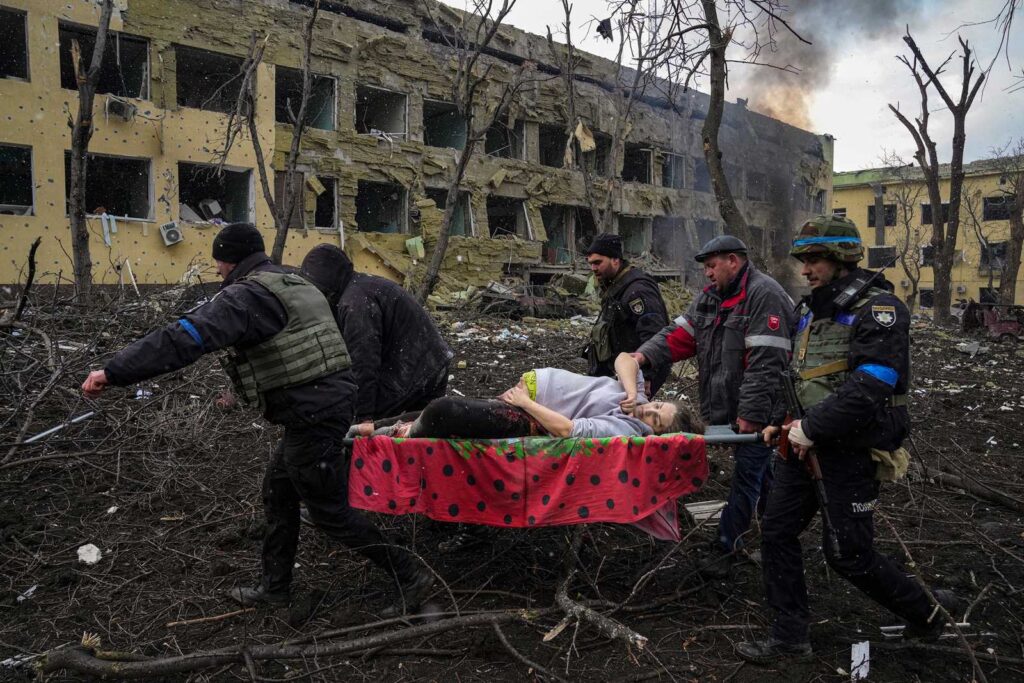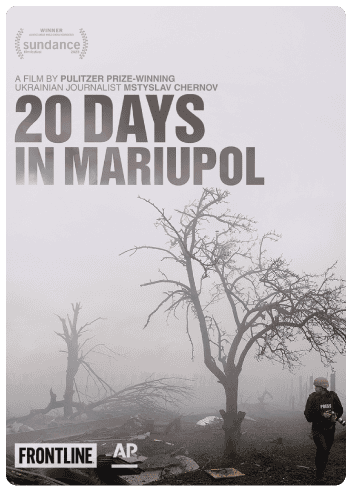20 Days in Mariupol – Snapshot
20 Days in Mariupol is the only on-the-scene journalism covering the first 20 days of the Russian assault and occupation of the southern Ukrainian port-city of Mariupol. The coverage documents Russian war crimes and the devastating effects they had on the Mariupol population. It is not easy to watch. (5*)
Where to Watch:
Stream: PBS Documentaries
Rent: Google/YouTube ($2) Fandango ($3) Prime ($7.50)
20 Days in Mariupol – The Oscar Buzz
Oscar Nominations (1) / Oscar Wins (1) :
Documentary Feature WINNER
20 Days in Mariupol is our fourth documentary submitted from a foreign country further confirming the fact that the movie industry is increasingly global. The film is the work of a three person Associated Press journalism crew that included an on-the-ground producer, a still camera photographer (Evgeniy Maloletka) and the video camera man (Mstyslav Chernov), who is also credited as the director, writer, and cinematographer for this film. In addition to winning the Documentary Feature Oscar, their reporting also won a Pulitzer Prize. These people are reporters first and so it isn’t surprising that this is their first feature film and their first time at the Oscars.
But 20 Days in Mariupol is more than just a series of news reports. There are several production decisions that help form this into a great film. One is the inclusion of drone shots of Mariupol. Nowhere in the film is it explained how they got those, but you almost have to assume that the team had a drone available to them which they used to take shots of the carnage and destruction down below. The birds-eye view enhances the films objectivity. Then, in addition to the drone shots and the team’s camera footage, is the inclusion of the news reports. As some of the material the team captured was beamed out, before communication links were severed, it was used by broadcasters around the world to illustrate the barbarity of the Russian “special military operation” as Putin called it. Seeing some of the scenes from Chernov’s camera on the screen repeated on television news programs shows the full power of video journalism. And we can’t minimize Chernov’s smooth, calm and minimal narration of the events that are so powerfully depicted visually.
Finally, we need to acknowledge two more people who helped turn this journalism into a great film. Michelle Mizner did the editing that magically, and almost seamlessly, managed to put all these elements together into a chronological and compelling story. She is an editor with Frontline, the producer of TV documentaries. She knows how to construct a cinematic document. And composer Jordan Dykstra provides an electronic, minor key, and discordant movie score that adds to the tension, without distracting from the visual story.
None of these people have any history with the Oscars or much of an involvement with the movie industry at all, and yet this small team managed to win the Documentary Feature Oscar. Chernov, in his acceptance speech, noted that “Cinema forms memories, and memories form history.” So he understands his place. But he also said “I wish I had never made this film. I wish to be able to exchange this for Russia never attacking Ukraine, never occupying our cities.”
20 Days in Mariupol – Related Movies
Navalny (Another documentary detailing inhuman Russian government mis-behavior.)
20 Days in Mariupol – What Others Think
Documentaries generally don’t get a lot of viewers. As I’ve noted on the previous three, access is often limited and because of that and lack of mainstream movie-viewer interest, the rankings on documentaries are usually based on a limited number of ratings. In the case of 20 Days in Mariupol, though, the viewer ratings are almost ten times that of the other films indicating an energized audience. So perhaps it isn’t surprising that viewers ranked this film not only the best documentary, but actually the best film of all 38 of this year’s nominees. (Should be noted, with a bit of irony, that it is tied with Godzilla Minus One for the number one spot.). Viewer reviews include titles like “One of the best documentaries I’ve ever seen”, “Positively Heartbreaking”, and “Please, Please, WATCH THIS!”.
Critics are almost as enthusiastic ranking 20 Days in Mariupol as the second best documentary (behind To Kill a Tiger), and the fifth best film overall (tied with the Best Picture winner Oppenheimer! Matt Zoller Seitz (RogerEbert) opined that it “…spares no one’s sensibilities” and “It goes on a short list of great documentaries that the viewer will never want to watch again and likely won’t need to because some of the images are so gruesome and the context so upsetting that they’ll be burned into your memory.” Nick Allen (also RogerEbert) wrote that “Journalism of this high order – equally heroic and selfless – …preserves lives with the power of shared information.” And Jayson Farago (New York Times) gave the film a Critics Pick and called it an “essential documentary”. The film impacted him so much that he concluded “The only moral question before us is whether we take these images seriously, or whether, with a skepticism also known as cowardice, we turn away.”
If you average all the ratings together, 20 Days in Mariupol still ends up being the highest rated film of all 38 of this year’s nominees.
20 Days in Mariupol – Special Mention
Mariupol Then and Now – In January, 2022 – just before Putin began his “special military operation”, Mariupol was Ukraine’s major port city bustling with an estimated 426,000 people. Now, two years after the Russians virtually demolished the city, the population is estimated at 80 – 120,000. Most of those no longer there were able to get out of the city in long convoys. However the number of dead since Russia started its brutal bombing, siege, and occupation of the city could be as high as 25,000. As much as 90% of the residential buildings in the city have been damaged or destroyed.
The assault on the city began on February 24, 2022 and the last Ukrainian troops surrendered on May 20, 86 days later. As the movie documents, the assault was intentionally structured to inflict civilian damage. The bombing of a civilian maternity hospital – documented in the movie in a series of heartrending images as pregnant women and babies die – is one of many war crimes lodged against Putin and his forces. War is hell, as they say, but it is at its worst when forces intentionally kill innocent women and children whose only “crime” was to be alive or recently born.
20 Days in Mariupol – Michael’s Moments
20 Days in Mariupol is a tearjerking reminder of what a documentary film can accomplish at its best. Three journalists for the Associated Press, aware that Putin had begun a full scale assault on Ukraine’s southeastern borders drove to Mariupol to document the opening days of the invasion. Seemingly without any hesitation, they threw themselves into the midst of some of the most intense battles as they captured the carnage unleashed by Russian bombs and artillery shells. They documented an unspeakable assault on a maternity hospital that killed pregnant women and babies and did so with a quiet resolve to speak the truth to military power.
Over the years, I’ve struggled to define precisely what makes a good documentary and, to a certain extent, it’s kind of like pornography – you know it when you see it. Perhaps the primary requirement is an honest intent to tell the true story. Rather than set out on a particular mission or convey a specific viewpoint, the filmmakers should always put the story, the words, and the actions of the people they are filming as their highest priority. And that story should be presented with as little commentary as possible. Whenever possible it should be the images and events that convey the story, not the narrator, nor the filmmakers. 20 Days in Mariupol does all of that with unvarnished truth that is Pulitzer- and Oscar – worthy.
Another requirement for a good documentary is that the story should be of compelling interest. The movie must present a reason to occupy someone’s mind for an hour or two. Clearly the beginning of the Russian invasion of Ukraine, as one of the major wars of our time, meets that requirement.
Importantly, the story needs to stimulate the mind, the heart, and the soul. While the film raises, but doesn’t answer the military and moral questions of why Russia did what it did, it certainly pounds the heart with a persistent sense of disgust for Russia’s leaders and deep sympathy for the people of Ukraine.
20 Days in Mariupol works as a movie because it accomplishes those things with a skillful combination of drone shots, on-the-scene video and still camera images, and the archival footage of some of those same images being broadcast on TV news. The simple, calm narration by the same person who captured the video images does not editorialize but provides a neutral background for the brutality that we witness. The discordant, electronic soundtrack gives a sense of alienation as we ask how this can be happening. And the chronological editing of all these things is done masterfully.
This certainly isn’t a feel-good movie. But if making you feel intensely is a mark of a good film, then 20 Days in Mariupol is definitely one. As the narrator intones early in the film. “It is painful to watch. But it must be painful to watch.” If you have any doubts about how horrible war is, or even if you don’t, watch this film. (5*)


